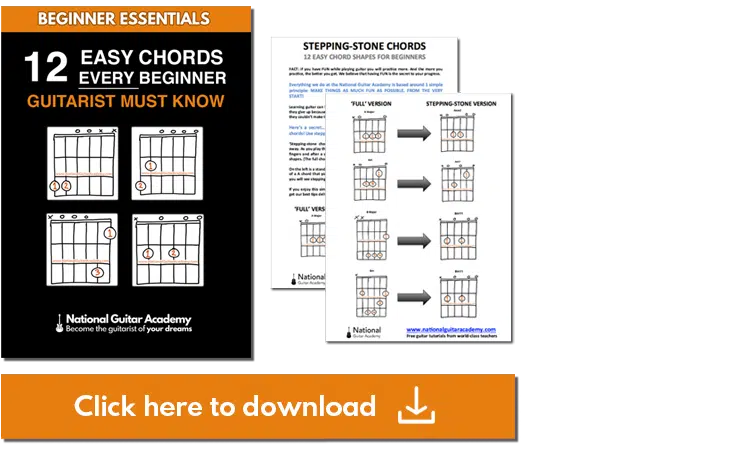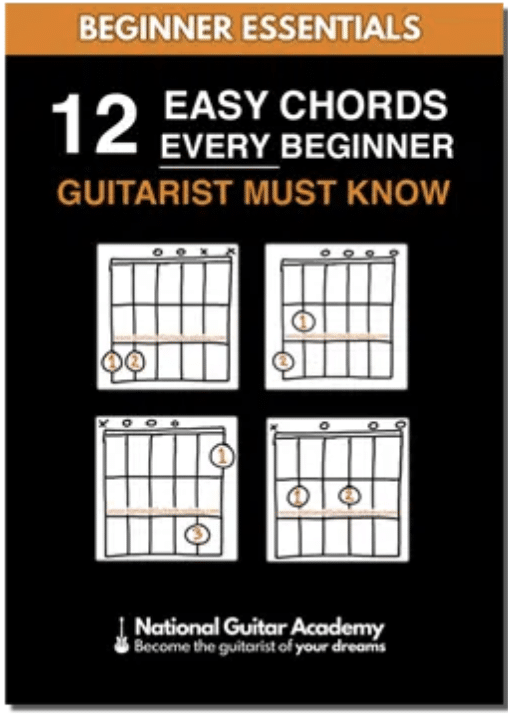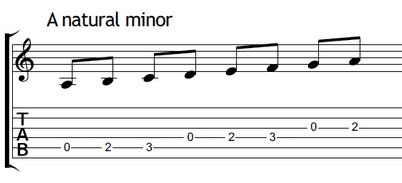6) C Major Scale Guitar – How and when to use the C major scale.
So, now we know the C major scale, what can we do with it?
Scales are not and should not be simply exercises we learn for the sake of it. They’re there to be used.
The most obvious thing we can do with the C major scale is improvise with it, this is also known as ‘jamming’.
Do you have a friend who plays guitar who’s written a song in the key of C?
Do you want to play along on lead guitar?
Then the C major scale is exactly what we need.
If a rhythm guitarist is playing chords from the key of C then a lead guitarist can play any notes they like from any of the C major scale guitar patterns we’ve looked at in this article.
Want to find out who the best guitarits of all time are? Check out this article by Rolling Stone: 100 Greatest Guitarists Of All Time
Don’t have a friend with a song in C on hand?
Not to worry, here’s a quick backing track for us that should suffice.
As you listen to these chords in the key of C, try playing some notes from one of the C major scale guitar patterns and see what happens.
Don’t worry about being technically flash. If anything, we want to keep things simple to begin with.
Try simply playing a note, and then another note, and then another note and listen to your lead guitar melody start to form itself.
Try to be creative with the order of your notes. Don’t just play the scale notes in order. That will sound like an exercise rather than a melody. Mix the notes about!
Don’t feel you have to start on the first note of the pattern either.
Remember, we’re not looking to play the scale here. We’re looking to create a melody or a solo using the scale.
But how do we know if a song is in C major?
Here are the chords from the key of C major:
C Dm Em F G Am Bdim
If a song uses any combination of these chords then we’re in C major.
For example, if the chords go:
C | F | G |C |
We’re in C major and can use the C major scale.
If the chords go:
G | F | C |C |
We’re in the key of C major and can use the C major scale.
If the chords go:
C | G | D | D |
Then we’re NOT in C major.
Why?
Because ‘D’ isn’t one of the chords available in the key of C.
Dm is, but not D.
The sequence started on a C, but sadly, that doesn’t always mean it’s in C.
If you want to learn how to move the major scale around the fretboard so you can play in other keys besides C, check out this article: Guitar Keys: An Essential Guide
✅ Stop struggling. Start making music. ✅ Learn beginner-friendly versions of every chord. This is our most popular guide and it will improve your chord ability quickly! 😎 Get a custom guitar-learning plan here: Click here for GuitarMetrics™ Learn from the world's best guitar educators: Click here for our guitar coursesLearn 12 EASY beginner chords with our popular guide


Where should we send it?
Get your own personalised guitar-learning plan 🎸
World-Class Guitar Courses 🌎
7) C Major Scale Guitar – The Theory Behind The Scale
As we mentioned earlier, the C major scale is the easiest key to think in.
It doesn’t contain any confusing sharp or flat notes. The C major scale contains just ‘natural notes’.
You know how a piano or a keyboard has some black keys and some white keys?
The natural notes are the white ones.
To spell the C major scale we simply start with C and work our way through the alphabet.
C D E F G A B
Some people are a bit confused by the fact that after ‘G’ we suddenly have an ‘A’ note.
There’s no ‘H’ note in music, or an ‘I’ note, or a ‘J’ note etc.
The musical alphabet only goes up to G. After that, we go back round to the beginning, which is A.
If you think about it, that actually makes the musical alphabet a lot simpler than the normal alphabet.
So if someone asks you, “What’s the third of C?” you needn’t be stumped.
All you need do is count along from C:
C D E
It’s E.
So the third of C is E.
If you want to know the fifth of C, again, let’s count along:
C D E F G
The fifth of C is G!
It’s really that simple.
Do you see what we mean when we say the C major scale is the doorway into the world of music theory?
Why not try playing some of the C major scale guitar patterns we’ve learnt today and say the names of the notes as you go.
8) C Major Scale Guitar – The A Natural Minor Scale
Every major key has what’s known as a relative minor key.
In the case of C major, it’s A minor.
So we can very easily transform a C major scale guitar pattern into an A natural minor scale guitar pattern.
Let’s find out how.
Here’s an open C major scale:

Note: because we’ve started two notes earlier, we’ve finished two notes earlier.
The C major scale and the A natural minor scale are basically the same scale just approached from a different angle.
Take our 60-second quiz & get your results: Take The Quiz Click here to learn more about National Guitar Academy membership Look cooler! Check out our merch: Click here to see our merch store Join over 100,000 guitar-learners and subscribe to our guitar-tips-by-email service. (It's free.) We'll send you a series of lessons that will move you to the next level of your guitar journey. Learn how everything fits together quickly, easily and effectively. We share ninja tips (for instant fun!) but also timeless fundamentals that will deepen your understanding.What Type of Guitarist Are You?
Join the world's best online guitar school 🌎

Cool Guitar T-shirts 😎
Want free guitar tips and video lessons delivered to your inbox?

How To Learn Guitar: An 11-Step Programme For Beginners How To Choose The Perfect Beginner Guitar Learn about National Guitar Academy: About Us Join us on Facebook for daily guitar tips. Listen to our Learn Guitar Podcast for rapid guitar progress. Check out our free chord lessons.Popular Lessons
More Cool Guitar Stuff
Get our best guitar tips & videos






